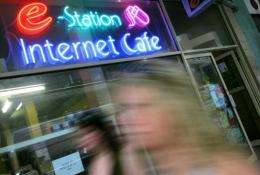Australia defends controversial web filter

Australia on Wednesday dismissed as "baseless" claims it was proposing a China-style plan for mandatory filtering of the internet and denied the system could be abused to silence free speech.
Communications Minister Stephen Conroy hit back at criticism of his plan to block access to sites featuring material such as rape, drug use, bestiality and child sex abuse.
"The claims that the Australian government plans to implement a censorship regime similar to China or Iran are baseless," Conroy told AFP.
"The government is only interested in blocking the absolute worst content such as child sexual abuse material, bestiality, sexual violence including rape and detailed instruction in crime and drug use," he added.
"There is no will or intention to block political comment," the minister said, adding that the government was trying to help parents protect children using the Internet.
Conroy announced Tuesday he planned to push ahead with the controversial plan after a seven-month trial found Internet service provider (ISP) filtering of blacklisted sites could be done with 100 percent accuracy and would have minimum impact on connection speeds.
The minister said 15 other Western democracies had also taken steps to implement filtering of offensive content, with Italy and Germany already passing the necessary legislation.
"ISP-level filtering is a useful measure as part of an overall cyber-safety plan and Australia is not alone in working to ensure it is in place for the benefit of the community," he said in a opinion piece distributed to media.
The government will introduce legislation next year requiring service providers to block blacklisted material hosted on overseas servers. Australia's four largest Internet service providers have said they back the plan.
But Internet user groups, the pornography industry and others have likened the system to those operating in repressive regimes such as China and Iran.
Some industry experts have questioned whether the filter could be effective, and one, Bjorn Landberg, told Fairfax media it was "clear that there are very strong political motives behind this."
Search engine Google questioned whether the filter would go too far, by blocking access to harmless material on areas of legitimate political debate such as euthanasia, sexuality and terrorism.
But Conroy said the filter would only apply to material from overseas that was already illegal to distribute in Australia and that the blacklist would be maintained via a public complaints mechanism managed at "arms length from the government."
"Most people acknowledge that there is some internet content which is not acceptable in any civilised society," he said.
(c) 2009 AFP



















